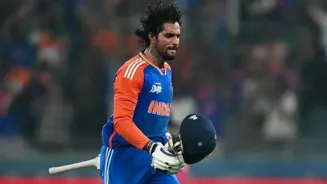On Sunday, September 28, Tilak Varma, the Indian left-handed batter, played a pivotal role for his team in winning the final of the Asia Cup 2025 against Pakistan at the Dubai International Cricket Stadium.
The 22-year-old scored an unbeaten 69 off 53 balls with three fours and four sixes, to anchor the run chase after India lost three early wickets in pursuit of the 147-run target in front of a packed house in Dubai.
After the Indian spinners brought the team back into the contest, bundling out Pakistan for 146 runs in 19.1 overs despite the opening stand of 84 runs, the top order of the Men in Blue had no pressure of the run rate in the chase. But the Pakistan pacers Shaheen Afridi and Faheem Ashraf bowled splendidly in the powerplay stage, dismissing the in-form Abhishek Sharma cheaply before sending Shubman Gill and Indian captain Suryakumar Yadav back into the pavilion within four overs.
With that, the pressure was firmly on the young shoulders of Tilak Varma to not only steady the ship, but also take India forward in the run chase with the senior partner and wicket-keeper Sanju Samson. These two batters shared a valuable stand of 57 runs for the fourth wicket, to bring India right back into the contest, mixing aggression with caution at right times.
Tilak Varma shared key partnerships with Sanju Samson and Shivam Dube after India lost early wickets
Following the departure of Sanju Samson back into the pavilion on the bowling of Abrar Ahmed for 24 off 21, Tilak Varma didn’t lose his concentration and put together a match-defining partnership with experienced all-rounder Shivam Dube. For the fifth wicket, Varma and Dube shared a 60-run stand to bring India to the brink of a famous victory during which the youngster completed his fourth T20I fifty as well.
The task wasn’t easy in the last over to score 10 runs in the all important final against Haris Rauf, but Tilak Varma kept his wits about himself and gave the strike to Rinku Singh, who finished off the match in style by hitting a four with two balls remaining. This was the ninth Asia Cup title in history for the Indian cricket team, by far the most among all teams that have competed in the continental tournament over four decades.












